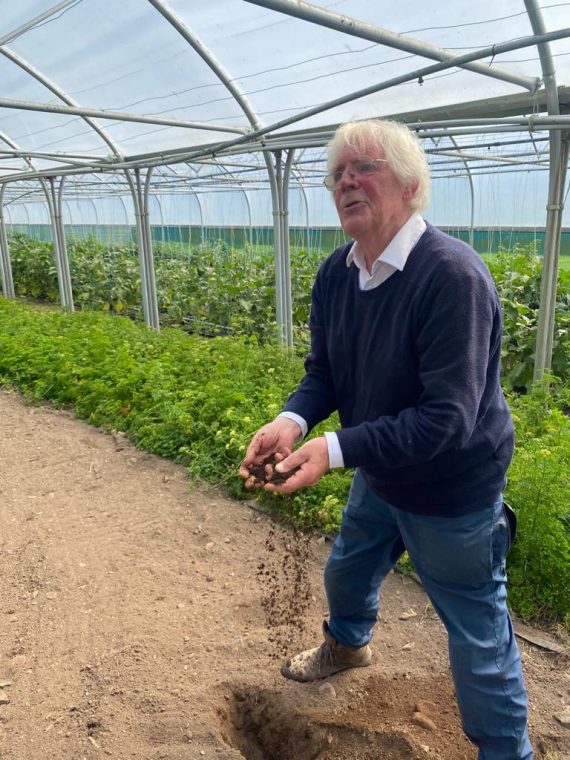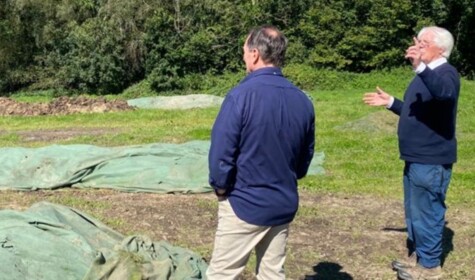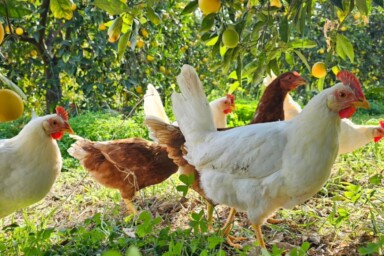Patrick Holden, CEO of the Sustainable Food Trust, introduces Peter Segger’s ‘manifesto for Welsh horticulture’.
As an old friend, colleague and co-conspirator with Peter Segger, whom I have known for 46 years since he and I first arrived in West Wales in the early 1970s, I urge you to read this important manifesto for Welsh horticulture. His ideas should be taken seriously for a number of important reasons.

Peter is without question not only a visionary but also one of the key leaders, now elders, of the UK and global organic horticultural movements. His many remarkable achievements include his election to the Soil Association Council in 1978, reinvigorating what was at that time a somewhat crystallized if not moribund organisation which had failed to maintain the vision and momentum of its founder Lady Eve Balfour; the founding of the Organic Growers Association; staging the very first national conference on organic horticulture at what is now the Royal Agricultural University (RAU) at Cirencester in 1980; establishing Organic Farm Foods (OFF), which subsequently became the leading supplier of organic produce to all the UK supermarkets (before they adopted the philistine policy of category management, which destroyed all the regional packing and distribution infrastructure which Peter had assiduously created over 15 years). Facing the demise of the company that Peter had built with courage and fortitude, he returned to his roots and subsequently created a beacon horticultural operation, that was carbon negative 20 years ahead of its time and committed to supplying Wales with fresh sustainably grown produce using simple crop rotations, composting and 1 1/2 acres of polytunnels on challenging soils.
For those who have not yet visited Blaencamel Farm, the farm Peter runs with his wife Anne Evans, a pilgrimage visit to West Wales is obligatory!
In the meantime, do read Peter’s proposition below, which sets out what should be regarded as a global template for the future of food through the prism of horticulture, showing how Wales could lead the world in feeding its people sustainably with vegetables and fruit.
Manifesto
Wales must create a new agriculture and horticulture: one where public money is only available in return for supplying public goods – and all the signs are that the Welsh Agriculture Secretary, Lesley Griffiths, and her civil servants will lead us in this direction.
If so, this could well be seen as a global beacon for one of the most difficult of all the sectors in facing up to climate change. Horticulture is very small in Wales but l have long believed that horticulture’s fairy godmother can sprinkle her magic stardust over the whole farming sector and bring about change for the nation. We need a political framework to harness all the myriad of practical actions and policies necessary for a seriously sustainable future.
The aim for this campaign should be:
Wales will produce 75% of all fresh produce consumed in Wales within 10 years.
Here are some key points to achieve this target:
- 100 additional large-, or more likely, medium-sized farms to provide the field crops we need. Here the NFU is taking a lead with some key members growing sustainable field vegetables this year as a trial. We observe signs that both farming unions, FUW and the NFU Cymru, are edging towards organic produce as a viable pathway to the future.
- Medium-sized growers like Blaencamel are key to providing the range of crops across the year. Our work has always been dedicated to expanding the range of crops through winter and spring, obviating the need to import from Spain and other parts of Europe. We might need only another 200 such medium-sized growers and this appears to be quite possible – with support.
- The expansion of small-scale specialists is hugely important. All over the world, young people with a few acres are making a living from specialist herbs, flowers, fruit and other crops, using protected structures to extend their season and add value.
- It is vital to encourage a vast expansion of allotments, city farms, rooftop growing, home gardening and turning public parks over to space for growing. All these activities are also part of society’s work to improve opportunities for special needs.
And to help achieve this, we need two dedicated colleges for horticulture in Wales. We would also require the County Councils to take ownership of the master plan and demand public procurement of domestic production, supporting farmers markets and all other retail outlets in a way not readily seen at present. Having farmers’ markets is not an optional extra – they are key to encouraging young growers to set-up and for the public to gain access to truly healthy and fresh produce, easily and at reasonable cost.
We also need Farming Connect, or similar bodies, to fill the gap and channel finance and grants for horticultural producers covering needs not recognised at present – irrigation, protected structures, cultivation equipment and marketing.
Finally, the key to success is finding enough suitable land. Councils should revisit the LSA land ownership scheme of the post-war period when it was used to offer employment to servicemen returning from the war. We should stop selling council farms and encourage the Treasury to give tax incentives to landowners who allow young entrants into a career in horticulture.
But most of all, we need a political campaign to encourage government – all governments – to take ownership of what can be a global innovation dedicated to young people, a healthy planet and hope.
So, let’s help the Welsh Government to meet the 75% within 10 years target and provide inspiration not only within Wales but around the world.







